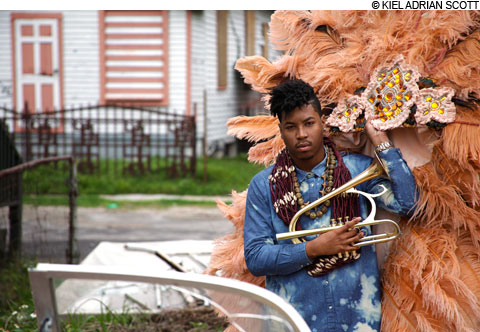
OPEN DEFINITIONS Despite his topical song titles, Scott says his music is more about "illumination"
than about taking sides or arguing an agenda. |
Since one of the first times I heard Christian Scott — at Sweet Lorraine's in New Orleans — he's always had an edge. It wasn't just his trumpet, but his band. They weren't playing jazz swing, but tricky groove patterns that built in intensity, driven by the gleaming, fierce sound of Scott's horn. It was well-considered and disciplined music, but not especially concerned with being polite.
Now, six years later, Scott (who comes with his band to Scullers on August 10) is still riding that edge. His fourth studio release for Concord Records is a double-CD, an audacious move in its own right. Its title, Christian aTunde Adjuah, is Scott's adopted African name. And the titles of individual songs hint at the range of subject matter that Scott is referencing: from his New Orleans childhood and history with that city's Mardi Gras Indians ("Spy Boy/Flag Boy"), to the city's post-Katrina history ("New New Orleans-King Adjuah Stomp"), to further-flung topics like ethnic cleansing and rape in Sudan ("Fatima Aisha Rokero 400") and domestic violence in the US ("When Marissa Stands Her Ground").
Scott knows there are limits to what he can accomplish with instrumental music that was created with very particular topics in mind. In fact, when I get him on the phone at his home in Harlem, he bristles a bit when I suggest that some of his songs are "political." "I look at it more as a social thing. As I understand it, 'political' is about the dissemination of power among people. With the music that I make, I'm not telling anyone that they're supposed to be going against anything or choose sides. I'm just illuminating things that I've experienced or things I want people to think about."
When you hear the album's first track, which begins with a piercing high-trumpet blast over roiling drums and unstable, rock-inflected guitar chords, you know that Scott is off about something, though you might not know what that is if you didn't see the title — maybe you know about the Rokero 400, maybe you have to look it up. Maybe you don't care and just want to listen. That's fine with Scott.
"Of course, I want people to know what happened to those women in Rokero. But if someone comes up to me after a gig and says, 'I got the new album, and when I heard the first song it made me think of the things I had to endure to beat cancer,' I'm not gonna tell that person, 'That's not what it's about."
Not every song deals with social strife. "Spy Boy/Flag Boy" harks back to the roles he and his twin brother Kiel played in his grandfather Big Chief Donald Harrison Sr.'s Mardi Gras Indian tribe, and the cover shows Scott in full regalia, surrounded by the peach-colored feathers of his Indian "suit." The album mixes hip-hop beats, African rhythms, and rock, informed by drummer Jamire Williams's encyclopedic vocabulary of beats and Matthew Stevens's ability to shift between rock-guitar edge and jazz flow. There are cinematic "interludes" throughout, marked by pianist Lawrence Fields's harmonic drifts.